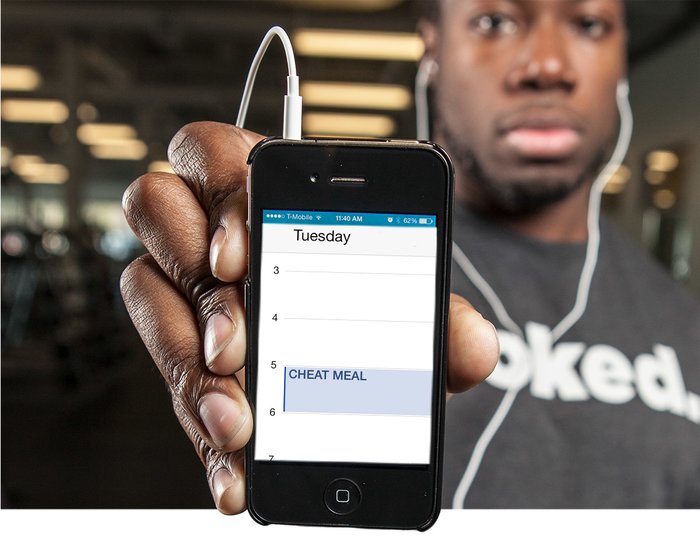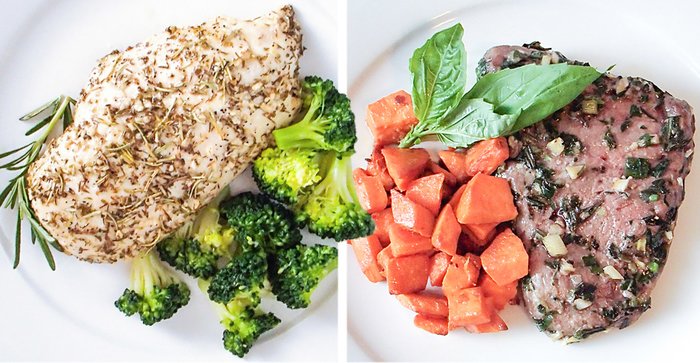When it comes to getting fit, diet is public enemy No. 1. It's the hardest part of fitness—especially in the long run. Don't get me wrong, trudging on the treadmill before sunrise or squatting your body weight after a hard day of work can be rough, but not giving in to the urge to clean out half the pantry can be even harder. I have a huge sweet tooth that leads me to crave sugar, but I'm able to resist thanks to two wonderful words: cheat meal.
Don't get me wrong, for most of the week sweet potatoes are my caramelized candy, but that doesn't mean I'm always on a competition prep diet. Yes, I cheat. I use the 90/10 rule to maintain sanity but, even more important, I use it as a dietary tool. When used correctly, cheat meals can be a great tool to help carve your physique. They can reset hormones responsible for metabolism and insulin regulation, replenish glycogen for increased energy, and keep calorie-burning and fat-torching mechanisms high.
Before you take that as a sign to rummage through your cupboards or head for the drive-thru, realize that cheat meals aren't a free-for-all. Cheat smart with these five tips.
1. Understand The Science Behind Restiction Diets
Regardless of how healthy we aim to be when dieting, cutting calories comes at a cost. In order to produce extreme leanness, many diets inevitably utilize weeks of calorie deficits and lower carbohydrates. Know the changes that occur within your body due to dietary caloric and carbohydrate restriction to help you understand why a cheat meal can actually be beneficial. Here's a quick hormonal tour!

Leptin, a protein mainly produced by fat tissue, regulates appetite and energy balance in the body. It acts on the brain's hypothalamus to suppress food intake and stimulate the use of energy, or calories. Leptin plays a key role in regulating body weight and fat mass through its stimulating effect on the brain. In fact, studies have shown that within 24 hours of fasting, leptin levels decrease to 30 percent of their normal value.[1]
But it doesn't end with leptin. Ghrelin, a peptide hormone mainly produced by the stomach, is an appetite stimulant that signals the release of growth hormone. Low-calorie diets and chronic exercise have been shown to result in increased ghrelin concentrations, which may lead to increasing food intake and body weight.
In addition to affecting appetite and energy use through leptin and ghrelin, sustained caloric-deficit diets also cause the body to attempt to conserve energy by decreasing levels of the thyroid hormones T3 and T4, which help regulate and maintain metabolism. Sustained low-carbohydrate diets deplete the body of glycogen stores and can leave you feeling sluggish and weak, which can negatively affect your training performance.
Pro Tip
Competition diets tend to cut to the extreme and cause dramatic bodily changes. Their effects can even mimic those seen in patients affected with anorexia nervosa and hypothyroidism. Basically, some competition prep diets can near the verge of a starvation diet, causing hormonal imbalances and slowing metabolism as the body attempts to adapt and maintain balance. Competitors, in particular, must balance their need to train intensely with their need for dietary restriction.
Be just as intense and strict about scheduling rest days, incorporating variety into your diet, and allowing for weekly cheat meals as you are about training. If you compete, know the toll that the sport can take on your body, and visit your primary care physician once or twice each year for a health check-up and blood work to monitor any changes in hormone balance.

Be just as intense and strict about scheduling rest days.
2. Use Science To Your Advantage
Since significant changes in the levels of leptin and ghrelin are seen after only 72 hours of a calorie-restricted diet, weekly cheat meals that are higher in calories and carbohydrates can help raise leptin levels and lower ghrelin. This is important because the return of your hormone levels to normal can help reverse or even prevent any negative effects on metabolism, hunger drive, and energy expenditure. In addition, the increased calories will also help to increase thyroid function, further boosting metabolism.
This increase in metabolism can last for days after your body digests a cheat meal, thus offsetting the drop in hormones that occurs when the calorie-deficit diet is again resumed. As a result, a scheduled cheat meal can actually help optimize our body's hormones to avoid weight-loss plateaus and prevent it from entering starvation mode. That's right, a well-rounded cheat can help you break through weight-loss plateaus!
Pro Tip
Leptin concentrations typically reflect total body fat mass. With this in mind, the leaner your physique becomes, the less leptin your body produces. This change in leptin as the season progresses is an even greater reason for adding cheat meals into your plan.
Human studies show that, in lean individuals, not only does leptin decrease faster with short-term fasting, but also the majority of the leptin available is bound. When bound, leptin is unable to suppress your appetite and stimulate energy use. Optimize the leptin that you do have by eating on time, and never skip meals.
3. Compose Smart Cheat Meals
If your idea of a cheat meal is a pint of Ben and Jerry's with a spoon, rethink your weekly reward. When it comes to choosing a cheat, be realistic. Even though you're allowed to break from your day-to-day diet, don't use a cheat meal as an excuse to overindulge. While you can indulge in a small, sugary treat from time to time, I recommend trying to avoid sugar-laden, nutrient-poor foods that can quickly ruin a week's worth of progress.

Instead, eat a cheat meal that is still well-balanced and higher in both calories and carbohydrates than your normal meal. Examples of cheat meals I typically incorporate are a cheeseburger with the bun (foreign concept, I know), two slices of pizza, a pasta dish with a protein source, chicken or shrimp fajitas with two tortillas, chicken stir fry with rice or noodles, or a filet mignon with baked potato and vegetables.
These meals are both high in carbs and protein, but they're also meals that I enjoy that leave me satisfied. Instead of stressing over the macros of my cheat meal, I eat a properly portioned and balanced meal and subscribe to the notion that, when it comes to stacked chocolate cake, sometimes ignorance is bliss!
Pro Tip
For the new competitor who may wince at the thought of purposely eating higher carbs and not avoiding white flour products, I assure you that it will be OK! In fact, it's essential in order to make the most of the meal, optimize its impact on leptin, and replenish muscle glycogen stores. Leptin secretion is stimulated by the release of insulin, which in turn is initially secreted by the presence of simple sugars or complex carbohydrates consumed. This means your cheat meal should be rich in carbohydrates. So, go ahead and reach for that nice, warm piece of bread or order the pasta dish. It's doctor-recommended.
Getting ready for a show? Keep track of timing before indulging in that weekly treat. I typically stop cheat meals 2-4 weeks out from a competition depending upon my physique and any changes that need to be made.
4. Schedule Cheat Meals
The best way to cheat is to plan ahead! Remember that, while cheat meals are meal replacements, they need to fit into your current eating regimen. Cheat meals allow you to satisfy cravings and give you a chance to loosen the reigns a bit, but they shouldn't turn into cheat days. They also shouldn't be a reason to eat less than you normally would at other meals.
The purpose of the cheat meal is to add extra calories to your current plan. Skipping meals before or after could end up limiting you cheat meal's effectiveness and ultimately backfire on you, causing you to become overly hungry and overindulge in your cheat. Avoid this potential pitfall by knowing the logistics behind your cheat meal. Pick a meal that will allow you to indulge without going overboard. Personally, I prefer to replace dinner with my cheat meal. I've found that this limits my tendency to want to snack the rest of the day, which is not the case when I opt to indulge at breakfast—hello, IHOP!

The best way to cheat is to plan ahead!
In addition to which meal you choose to replace, which day you choose to have your cheat meal is also a key factor. I find often that the mental and emotional aspects surrounding a cheat meal make it more fun and enjoyable. Instead of scarfing down a greasy takeout taco while driving home from work, build your cheat meals into social situations.
Try switching up your cheat day until you find one that best fits your lifestyle. If you have difficulty jumping back on track after a mid-weekend treat, consider moving it to Sunday night. After all, there's nothing like Monday morning and the start of the workweek to ground you in reality and get you back on track.
Pro Tip
If you eat at a restaurant, choose healthier, well-balanced options. Avoid items coated in cream sauce and dishes sauteed in butter. Also opt for items lower in sodium, which, in excess, may lead to stroke, kidney disease, and coronary heart disease. Not sure what's healthy? Check the restaurant's nutrition guide or browse through nutrition apps like MyFitnessPal.
It's easier to continue to snack after you bring a cheat meal home. Limit temptation by keeping your meal to a specific, predetermined quantity and avoid the doggy bag.
5. Know Your Cheat Meal Tolerance
While I recommend cheat meals for the positive effects they can have on your metabolism, energy, and even your psyche, cheat meals do more harm than good for some people. Unfortunately, how they'll pan out for you can only be discovered through a process of trial and error. If you find that you have difficulty sticking to your meal plan after a cheat meal or experience increased cravings that are difficult to manage, it could be a good time for you to reevaluate whether cheating is beneficial for your goals.
Sometimes deviating from your standard chicken breast and low-carb veggies to steak and a large baked potato instead of pizza can satisfy a craving to cheat without leading to total self-sabotage, but you have to discover and make that call.

Pro Tip
When I'm in competition prep and close to a show, I always cook my cheat meals at home. In this, I always know exactly what I consume. Restaurants are notorious for adding sugar, salt, butter, and cream to food and, although you can make requests, there's no guarantee that they're followed. Cooking at home leaves nothing to chance.
Honesty is always the best policy. Being honest with your coach about additional cheating can be a helpful tool. Knowing which food you were craving or cheating with can sometimes point to deficiencies in your diet that your body is attempting to correct. Cravings for particular foods often manifest when you're too low on certain macronutrients. An experienced coach can take this information and make changes to your diet to help alleviate this.

